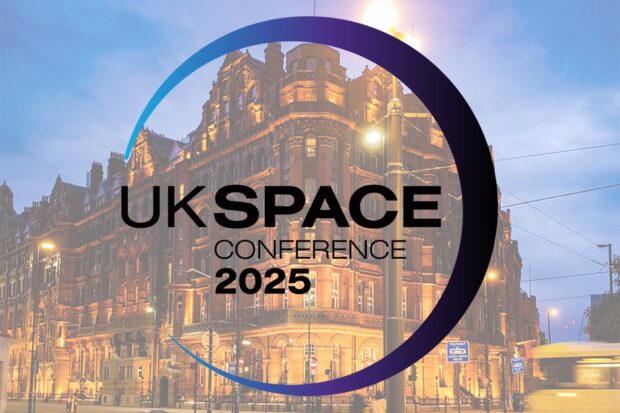Space business leaders say the UK’s Modern Industrial Strategy ‘sets the stage for timely and meaningful discussion at next month’s UK Space Conference’.

As UK Space Conference prepares to convene on 16–17 July in Manchester, UK space business leaders have voiced broad support for the UK government’s new industrial strategy.
The Industrial Strategy names space as a ‘frontier’ industry alongside 10 others “where investment supports both economic growth and security”. The space sector sits across two of the detailed sector plans, ‘Advanced Manufacturing’ and ‘Digital and Technologies’.
On that basis, UK space businesses now sit squarely in two flagship sector programmes, potentially opening a broader pool of innovation grants, facilities, and cluster support.

Space Business Leader Reaction
UK Space Conference in Manchester on 16-17 July will be the first chance for space sector leaders to convene and discuss the implications of this announcement.
Nick Shave, Managing Director of Astroscale UK says:
The UK Government’s Modern Industrial Strategy marks a major step forward for the space sector, particularly for In-Orbit Servicing, Assembly, and Manufacturing (ISAM). With the Advanced Manufacturing Sector Plan, it creates a more supportive environment for high-assurance innovation, underpinned by commitments to R&D, infrastructure and skills. The strategy also strengthens national resilience by backing truly nationally separable capabilities in critical dual-purpose technologies and recognising space as part of the UK’s Critical National Infrastructure. At the same time, its export-focused approach positions UK ISAM capability to support allied missions and expand global partnerships — a vital balance for long-term competitiveness and security in space.
“The UK’s Modern Industrial Strategy is likely to make this year’s UK Space Conference more focused on both practical delivery and strategic collaboration. With space identified as a key growth sector linked to advanced manufacturing and national resilience, discussions will shift from exploring potential to shaping concrete plans around infrastructure, supply chain security, and export opportunities. The strategy’s emphasis on strengthening sovereign capabilities in critical technical areas and fostering international partnerships will encourage deeper dialogue on how the UK space sector can strengthen its global position while supporting defence and critical national infrastructure. Overall, the conference is set to bring together industry and government with a shared drive to accelerate the UK’s space ambitions and secure its position as a global leader, particularly in the high growth ISAM market.”
Lewis D’Ambra, Head of Government Affairs, Space Forge says:
“The new Industrial Strategy signals a pivotal shift in how the UK backs its most promising space innovators. We welcome the government’s sharper focus on core capabilities - it’s exactly what’s needed to unlock scale and position the UK as a manufacturing powerhouse in orbit and on Earth. From advanced materials to in-orbit servicing and launch, this strategy connects the dots between innovation, industrialisation and sovereign capability - and Space Forge is ready to deliver on that vision.”
Daniel Smith, Founder, AstroAgency, says:
“It’s encouraging to see the UK’s Industrial Strategy recognise space technology as both critical infrastructure and a key driver of economic growth, underpinning a wide range of business sectors. With effective delivery, it has the potential to catalyse the sovereign capabilities and resilience the industry has long called for. Alongside the Strategic Defence Review, it sets the stage for timely and meaningful discussion at next month’s UK Space Conference in Manchester.”

Jake Geer, Managing Director Orbit Fab UK says:
“The inclusion of space in the Industrial Strategy, and the renewed focus on the five capability areas like IOSM identified in the Space Industrial Plan, gives a clear signal to business about the UK's readiness to scale-up. At a time when many other European nations are doubling their space commitments, the UK government endorsing space as a key growth industry is particularly welcome. The UK needs to move fast to deliver these commitments, and we now wait to see how, when and at what speed the Spending Review will implement the planned interventions.”
Dr. Marco Rocchetto, CEO of Spaceflux says:
“Spaceflux welcomes the UK’s Modern Industrial Strategy, published this morning. Combined with targeted support for areas such as space situational awareness and in-orbit activities that advance both sustainability and security, the strategy has the potential to make a meaningful impact on the space sector and the wider economy. We look forward to discussing next steps at the UK Space Conference in Manchester.”
Alan Thompson, Head of Government Affairs, Skyrora ltd says:
“The Industrial Strategy most importantly signals the growing economic coherence and interconnectedness that will continue to enable growth and be further reinforced by faster growth of the UK Space industry.
“Highlighting the UK's aspiration for In Orbit Service And Manufacturing and creating a green corridor for the start of a commercial Launch service, both will necessitate and inspire the further development of both satellites and spacecraft. This will also lead to the growth of "Next Space" companies developing on orbit services, following in the path of Space Forge, Astroscale, and Clear Space who are pioneering in partnering with regulators to achieve responsible deployment of their engineering capabilities.
“Coupled with longer term availability of funding resources, and a commitment to supporting with the education and skills ecosystem we see every reason to be hopeful in the space industry about a strong industrial base being formed, and a clear strategic imperative emerging of the significance and importance of the space domain to the UK.”
What does the UK’s Modern Industrial Strategy say about space?
In the ‘Advanced Manufacturing’ sector plan, the government recognises that supporting too many space ‘areas’ has limited growth; a tighter focus on core capabilities and better access to capital is required.
Priority areas for space include:
- Satellite Communications: Enhancing our capabilities in satellite communications to support both commercial and national security needs.
- Position, Navigation, and Timing (PNT): Developing robust PNT solutions to ensure the UK’s strategic autonomy.
- In-orbit Servicing, Assembly, and Manufacturing (ISAM): Pioneering technologies for in-orbit servicing and manufacturing to extend the life of satellites and reduce space debris.
- Space Domain Awareness: Strengthening our ability to monitor and protect space assets.
- Space Data for earth applications: Building a resilient and secure data infrastructure to support space operations.
Investment and funding
- £80 million over five years to support the development of these strategic capabilities.
- Private Investment Framework for Space: Attracting and channelling private capital into high-value space technologies and companies.
- UK Space Agency initiatives - such as the National Space Innovation Programme (NSIP) and Space Clusters Infrastructure Fund (SCIF): Bolstering R&D infrastructure and supporting the growth of space companies.
Regulatory and Policy Support
- Space Industry Advisory Group to be created comprised of government and industry representatives that will advise on the government’s decision-making, strategy development, and delivery of the UK’s industrial space ambitions.
- Regulatory Innovation Office: Implementing innovative regulatory frameworks, including the Space Regulatory Sandbox, to facilitate the development and deployment of new space technologies.
- Space Sustainability Standards: Developing standards to ensure the sustainable expansion of our space capabilities.

International Collaboration
- Bilateral R&D Funding: Increasing funding for collaborative projects with international partners to enhance our technological capabilities and market reach – spending £75 million over 5 years.
- European Space Agency Membership: Continuing our commitment to ESA to leverage international expertise and opportunities.
Workforce Development
Space Education and Future Workforce Programme: Developing technical and non-technical talent to meet the sector’s evolving needs.
Skills England Partnership: Ensuring a sustainable pipeline of skilled professionals through targeted training and development initiatives.
The Approach
- Grow the space sector by targeting specific capabilities, becoming a leading industrialised European exporter by 2030.
- Increase the revenue generation of the space sector by focusing efforts to create more industrialised companies with greater than £10 million revenue.
- Unlock greater access to capital for space companies to scale and industrialise through equity, debt financing, and other mechanisms.
- Create greater competition and diversity within the sector at the top of the supply chain, working more strategically with space companies that do or should play outsized roles in supply chain development.
- Enhance supply chain resilience to support national security and defence, in particular in highly assured technical areas and space Critical National Infrastructure.
In addition, the Digital Technologies Sector Plan also identifiesAdvanced connectivity technologies (ACT)as a priority sector, which will concentrate on defence, transport and future telecoms networks including satellites.
Notes
About UK Space Conference
UK Space Conference is the UK space sector’s official forum for growth, held biennially in partnership with the UK Space Agency. It brings together industry, government, academia from across the global space ecosystem to explore opportunities and challenges shaping the future of the UK in space.
UK Space Conference 2025 lands at Manchester Central on 16–17 July under the theme ‘Space for Growth’, with a programme focused on commercial opportunity, science and innovation, defence and resilience, and the role of space in wider economic and societal transformation.
Join us in Manchester on 16–17 July 2025.
www.spaceconference.co.uk
For media questions or to arrange press accreditation at UK Space Conference, please contact: commsteam@UKspaceconference.co.uk
Leave a comment